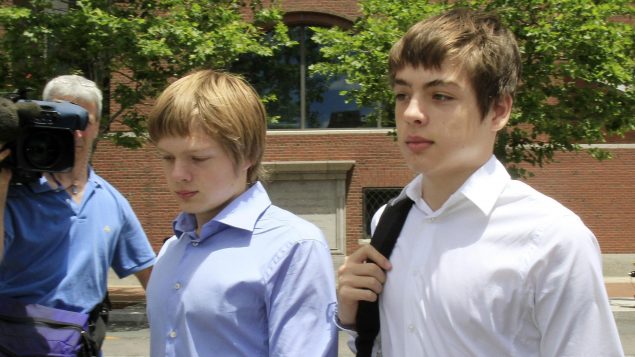The Canadian-born children of a deep-cover Russian spy couple are citizens despite the fact that their parents were living in the country under assumed identities, Canada’s highest court ruled Thursday.
The decision by the Supreme Court of Canada ended a seven-year legal saga for 25-year-old Alexander Vavilov.
“The relief I feel reading the Supreme Court’s decision is indescribable,” Alexander said in a statement issued by his lawyer. “It is recognition that not only do I feel Canadian, but I am Canadian in the eyes of the law.”
Aside from addressing the citizenship matter, the Supreme Court ruling aimed to bring clarity to the nature and scope of judicial review of decisions by administrative officials.
Alexander and his older brother Timothy, 29, were born in Canada to Donald Heathfield and Tracey Foley, who were sent to the country in the 1980s as KGB agents whose real names were Andrey Bezrukov and Elena Vavilova.

Timothy, left, and his brother Alex Vavilov are shown leaving federal court after a bail hearing for their parents in Boston in 2010. (Elise Amendola/Associated Press)
The family eventually moved to the U.S. and took up residence near Boston.
But it was only when FBI agents swarmed the family home in 2010 that the brothers found out their parents were deep-cover agents, for SVR (Sluzhba Vneshney Razvedki), one of the successor spy agencies after the KGB was broken up following the collapse of the Soviet Union in 1991, CBC News reported.
They were sent back to Moscow as part of a prisoner swap with Russia, according to a summary of the case issued by the Supreme Court.
When Alexander tried to renew his passport, his application was denied on the grounds that his parents were employees of a foreign government, which made him ineligible for Canadian citizenship.
Vavilov appealed the decision all the way to the Supreme Court, which ruled that because his parents did not enjoy “the privileges and immunities” afforded to diplomats and spies under diplomatic cover, the rule about foreign government employees did not apply to him.
A Federal Court decision in 2018 said that the ruling over Alexander’s case would apply to both brothers, according to The Canadian Press.
With files from CBC News and The Canadian Press







For reasons beyond our control, and for an undetermined period of time, our comment section is now closed. However, our social networks remain open to your contributions.